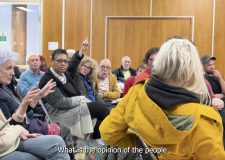DVLA bans Brighton and Hove City Council from using its database
Brighton and Hove City Council has been banned from using the DVLA database of cars and drivers.
Campaigning watchdog Big Brother Watch said that Sussex Police had also been temporarily banned from using the national database.
The council and police were among more than 300 public sector organisations to have had their access to the information withdrawn.
The main reasons were either for not using the database properly or for failing to comply with audits to check that usage complied with the law.
The DVLA (Driver and Vehicle Licensing Agency) banned the council permanently in September 2009 after writing to ask about the way in which it was using the database. The council did not reply to the inquiry.
Sussex Police had its access suspended from Friday 27 April to Wednesday 2 May over “audit issues”.
Big Brother Watch said: “Councils trawl the database of every registered driver in the UK to find the addresses of motorists refusing to pay parking fines, among other things. But the DVLA regularly checks for security and other breaches.
“It has temporarily banned 294 bodies since 2009, including local councils, Sussex Police and Transport for London.
“In addition, 38 organisations have been permanently banned over the same three-year period, including some the UK’s biggest local authorities such as Camden, Southwark and Brighton and Hove.
Cost
“The information local authority officials seek from the DVLA is often available from other sources but at a higher cost.”
Big Brother Watch, which campaigns on civil liberties, said that the banned list was uncovered through a Freedom of Information request.
It added: “Many of the abuses were due to poor administration, such as not responding to letters from the agency or returning contracts in time.
“In other cases, local authorities asked other local authorities to make inquires on their behalf but did not reveal that this was the case.”
Big Brother Watch director Nick Pickles said: “Concerns about the DVLA database have been voiced for several years.
“But it is remarkable that in just three years nearly half the country’s councils have been suspended from looking at motorists’ information.
“The same concerns exist about a range of other databases and the public are right to be worried that their privacy is at risk across a range of government services.
“The question is whether these suspensions hinder staff trying to do their job while the staff doing the unauthorised searches escape proper punishment.
Prison
“One key issue that still has not been resolved is whether someone could be sent to prison for deliberately abusing the databases they have access to and that deterrent is badly needed.”
The DVLA holds a range of information on drivers and vehicles including
- details of convictions and penalty points
- relevant medical information
- the address cars to which cars are registered
- details of every vehicle’s make and model
A DVLA spokesman said: “The DVLA takes its duties with regard to the use of its data very seriously.
“The agency operates a stringent system with regard to electronic access to its data by local authorities, including regular audits.
“Where we become aware of any issues relating to the use of our data, we will investigate and take swift action where appropriate.”
The Local Government Association said that councils used the DVLA database to find the details of owners whose vehicles had been abandoned or were causing a nuisance.
They also used the information to trace people suspected of environmental offences such as fly-tipping, littering, dog fouling and fly-posting.
It added: “The majority of suspensions are short-lived and down to technical errors relating to the use of the database, nothing to do with inappropriate access.”




















